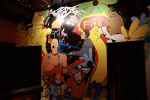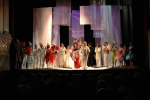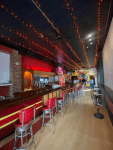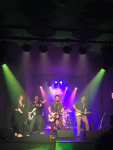 by Angel Park
by Angel Park
There’s something special about Philadelphia’s music venues. They’re not just places to see local and touring bands – they’re a vital part of the city’s musical fabric. Philly music venues have a unique character that comes from their historic buildings, intimate settings, and passionate audiences. As passionate supporters of all things local music, our staff at ThatMag will be shining the spotlight on some local venues that have become staples of Philadelphia’s thriving music community.
Karen Lauria Saillant is the owner of the Fire, one of Philadelphia’s most revered music venues. The Fire has been a local fixture for over two decades, and it has played host to some of the city’s most talented musicians. Saillant is a passionate advocate for local music and has worked tirelessly to ensure that the Fire remains a vital part of the Philadelphia music scene. We had the chance to sit down with Saillant this past week inside her venue to discuss the Fire‘s rich history, its impact on the community, and what the future holds for this revered Philly venue staple.
ThatMag: Let’s start from the beginning – back in the ’80s before The Fire was known for what it is today, it was actually The Philadelphia Bar and Grille. What inspired you to transform it into a music venue?
Karen Lauria Saillant: My husband and I originally bought a tavern in Northern Liberties and named it The Philadelphia Bar and Grille in 1988. We did this so that he could leave truck driving and have more time to be able to attend his son’s athletic games, which was wonderful!
As for what led up to transforming it into a music venue: In 1999, my husband went into a vegetative coma trying to stop a man from attacking me and my son in front of our home in Center City. We took care of him in our home for 16 months and then he died. During that time I had to start running the Philadelphia Bar and Grille. I had cooked at the bar here and there, but I was pursuing my career as an opera singer and director, and vocal coach.
We had an adjacent room, the size of the bar, which had been our pool room. And I, with great trepidation, took out one of the pool tables and put in a tiny little stage and started bringing my singing students, who were not opera singers, there to perform. And that’s how the music venue began.
TM: The Fire has not only built a reputation as a staple of Philadelphia’s local music community but is the only female-owned venue in the city. What were some of the biggest challenges you’ve faced throughout the past 20 years as a woman in the music industry?
KLS: There have definitely been quite a few challenges and without getting into too much detail, a lot of them have been direct challenges to me as a female venue owner. I’ve had past venue partners and booking agents who’ve definitely taken advantage of my naivete and collaborative nature especially when it came to booking artists. By 2018, the situation had become so dire that I had to sell my home of 50 years in order to save The Fire. It should go without saying, but never be afraid to stand up for yourself!!!!
TM: In addition to owning The Fire, you’re also the founder of the International Opera Theater of Philadelphia, which has been putting on incredible performances in the city since 2003. What projects are you currently working on there?
KLS: Right now we’re working on what we’re calling the FLOW project, (spelled like FLOW) and we’re going to also bring that project to The Fire as well. The main goal of this project is to encourage artists and others to utilize music in FLOW as a way to take a stand against all of the violence and horrible things happening across this country right now.
The concept of FLOW can be best explained like this: if we were all in FLOW, then we’d all be in a right-brain dominant state of mind, which is a higher consciousness that enables us to be more compassionate and understanding, and caring. If more people were ‘in FLOW’, so to speak, essentially we’d have more harmony.
We have artists from 56 countries involved, so it’ll be the most diverse opera in history. And for that reason, it’s probably the most complicated opera. We’re still putting it together. Stay tuned!
TM: How do you feel about the current state of Philadelphia’s music scene? What changes, if any, would you like to see implemented?
KLS: I have been involved with the Philadelphia music scene since I was four years old. And I was very active in the Renaissance in the Philadelphia music scene on South Street in the 70s. And the way it feels to me now, like what is it, 50 years later, is that Philadelphia [is], I believe, finally coming together as a community in the music industry. We have an organization called PIVOT, initiated by Carrie Park at World Cafe Live, and with the participation of every Philadelphia venue and we are working to support one another and help one another. So competition is not at the heart of our interactions, but rather love and caring. And I think that’s so exciting!
TM: What is your vision for The Fire and the International Opera Theater five years from now?
KLS: I hope that we can help inspire musicians to raise their consciousness. And in doing so, be able to raise the consciousness of our city. We desperately need music right now, but just not just any music, music that is inspirational, in-FLOW, and able to cultivate a culture in our city that supports harmony and balance and love and compassion for one another. And I hope that The Fire and the International Opera Theater can emulate those ideals and help share them with the world.
The project is also going to involve a custom invention called ‘The Adagio Flow Machine.’ It’s something a totally unique invention that gives the artist an opportunity to see in a concrete way where their music goes out of FLOW, and therefore make the adjustments necessary in the composition and execution of the music that will enable it to be in FLOW. James Wilson, a graduate of Temple University’s advanced composition program, the inventor of the machine (who has had the machine’s effectiveness confirmed by Joseph Kamiya, the father of neurofeedback, in a definitive study at Nova University, Fla.) said that music actually has four elements. We know it has rhythm, it has harmony and it has melody, but it also should have FLOW. And this doesn’t just apply to classical music, all genres of music have this potential. So God has given us music and I hope that The Fire and the International Opera Theater will represent the highest values that music can offer humanity.”
Learn More About The Fire and International Opera Theater
Dante, The Opera | Philly-in-FLOW Project
Connect with The Fire
Website | Facebook | Instagram | Twitter
Connect with the International Opera Theater
Photo Gallery












